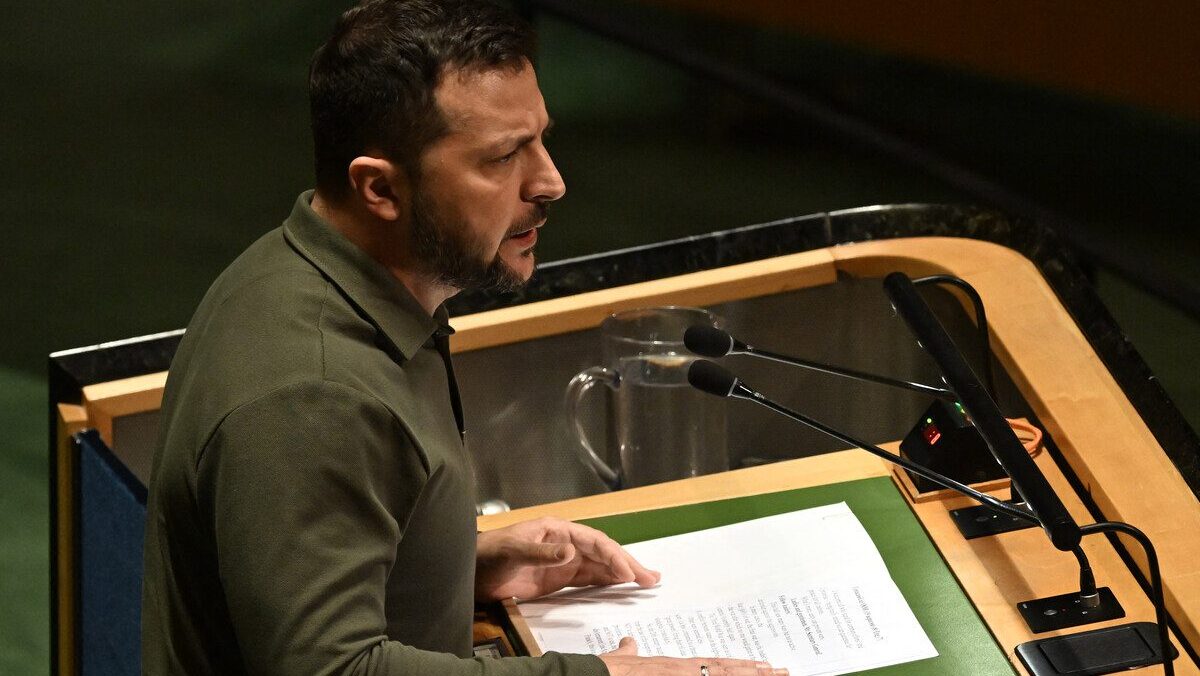
Ukrainian President Volodymyr Zelensky addresses the 78th United Nations General Assembly at UN headquarters in New York City on September 19, 2023.
Photo: Ed JONES / AFP
Ukrainian President Volodymyr Zelensky has attacked countries that are “helping set the stage” for Moscow by blocking Ukrainian grain imports, utilising Russian energy sources, and insisting on peace negotiations.
In his speech at the General Debate of the 78th Session of the UN General Assembly in New York on Tuesday, September 19th, Zelensky first and foremost lambasted Russia for invading Ukraine nineteen months ago, and called upon the members of the United Nations to “act united to defeat the aggressor”. He dedicated a large part of his speech to listing the things that Russia was weaponising—like food shortages on the global market, food prices and energy exports. Without naming them, he also criticised some countries for assisting Russia with their actions.
“It is alarming to see how some in Europe play out solidarity in a political theatre—making thriller from the grain. They may seem to play their own role but in fact they are helping set the stage to a Moscow actor,” Zelensky said, referring to Hungary, Poland, and Slovakia, which are blocking sales of Ukrainian agricultural products in their countries to protect their own farmers. In response, Ukraine is suing these countries through the World Trade Organisation.
The European Commission lifted trade barriers with Ukraine to allow its agricultural products, including wheat, eggs, and oil seeds, into the EU, so that they could pass through the so-called “solidarity lanes” into the global market to reach poorer regions such as North Africa that rely on imports. The measure was meant to counteract the Russian blockade of the Black Sea, the main trade route out of Ukraine.
“Russia is weaponising nuclear energy. Not only is it spreading its unreliable nuclear power plant construction technologies, but it is also turning other countries’ power plants into real dirty bombs. Look what Russia did to our Zaporizhzhia power plant—shelled it, occupied it and now blackmails others with radiation leaks,” Zelensky said.
Hungary has made it clear it would oppose any EU proposal to level sanctions on Russia’s nuclear power industry, arguing such a decision would adversely affect the operations of Hungary’s only nuclear power plant, which is powered by Russian-produced nuclear fuel. Hungary also got an exemption last year—along with the Czech Republic and Slovakia—from an EU embargo on Russian oil imports.
Zelensky also talked of his “peace formula,” which he will present at a special meeting of the UN Security Council on Wednesday. Ukraine insists that Russian troops should abandon all occupied Ukrainian territories—including the Crimean Peninsula, annexed in 2014—before any negotiations on peace can start. “I am aware of the attempts to make some shady dealings behind the scenes,” Zelensky said, referring to several African and Latin American countries, as well as China, that are advocating that Ukraine enter into unconditional peace negotiations.
Sure enough, Brazilian President Luiz Inácio Lula da Silva urged for dialogue in his speech at the UN. Referring to conflicts all around the world, he said: “I have reiterated that work needs to be done to create space for negotiations.” While attacking Russia for its “violation of the United Nations Charter and international law,” and for unleashing “a nexus of horror,” UN Secretary-General António Guterres also emphasised: “We must not relent in working for peace—a just peace in line with the UN Charter and international law.”
Hungary has been the only EU member state calling for immediate peace talks between global powers to secure a ceasefire in Ukraine, with Prime Minister Viktor Orbán recently saying it is “impossible” to defeat Russia, “they will never give up”. In her speech in New York, Hungarian President Katalin Novák explained that while Hungary condemns Russia’s actions, and “stands for the territorial integrity and independence of Ukraine … we have a duty to represent our own nation’s desire for peace”.
Rhetoric on starting peace negotiations is becoming ever-louder as frontlines in Ukraine have remained relatively static in the past year, despite a Ukrainian counteroffensive. The NATO secretary general’s chief of staff Stian Jenssen recently said that ceding parts of the occupied territories and putting an end to the war should be a realistic option for consideration by Kyiv.
Meanwhile, the chair of the European Union’s Military Committee (EUMC) General Robert Brieger warned that the Russian war machine has much more longevity than most observers believe and that the current Ukrainian counteroffensive is failing to produce the results needed to restore the nation’s full territorial integrity. The frontrunners in the race to become Republican Party nominee in next year’s U.S. presidential elections are all sceptical of giving more military assistance.
